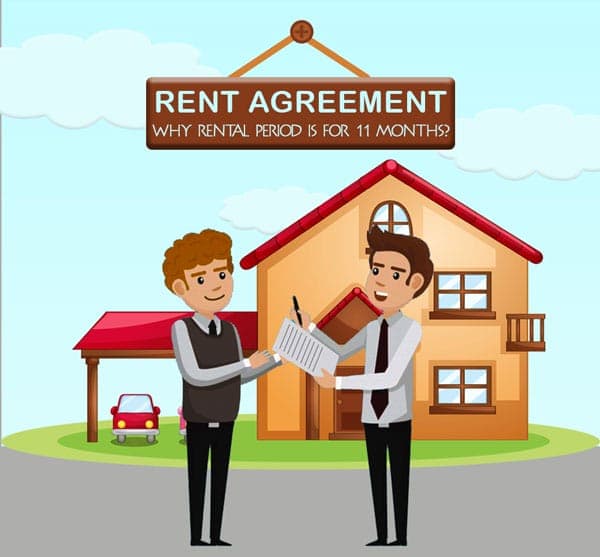
Rental agreements between the tenant and owner are usually done for 11 months. Ever wondered why so? And why there is a need for a rental agreement at all? Well, it is important to have a document that serves the interest and rights of both the tenant as well as landlord. Hence, rent agreement is the best way to take a careful approach for renting property.
What is a Rent Agreement?
Before discussing further regarding the rent agreement, let us know what is it?
A rent agreement is a legal document that addresses the tenant and the property owner and safeguards the interest of both of them and also describe rights, duties, roles and responsibilities of both.
The landlord must be the property owner or a person having power of attorney from the owner.
It also prevents the unnecessary rise in the rent value and eviction from the premises without prior notice of minimum one-month duration.
Why Rent Agreement of 11 Months?
If the rental period is kept for 12 months that is for a year or more i.e. one month more than 11 months in the rental period, there are other laws which comes into force and become applicable.
This complicates the process both for the landlord as well as the tenant.
In order to prevent this situation, the rent period of 11 months is kept irrespective of the period which the landlord may have in mind i.e. he temporarily ignores his long term intent.
This contract of the rental period is renewed for another term of 11 months and in this way other complications are avoided by both the parties.
For a landlord or house owner, it would be burdensome from legal perspectives.
Laws Applicable for Rent Agreement Exceeding 11 Months
Let us have a look at laws that becomes applicable and consequences that follows the rent agreement if it exceeds the time period of more than 11 months:
Monetary Issues
- As per the Registration Act, 1908, it is stated Under Section 17 that it is compulsory to register all leases of immovable property from year-to-year or for a term exceeding a year. Hence if you agreed for more than 11 months you will have to report at the office of registrar legally, which will attract huge stamp duty.
- If the renting period exceeds more than 11 months, then the involved parties i.e. the tenant, as well as the landlord, will have to pay the stamp duty and registration charges.
- Then it will be the responsibility of the tenant to bear the stamp duty and registration charges.
- It also differs from state to state & city to city and also on the rent amount.
- In the country’s capital Delhi, 2 % of the average annual rent needs to be paid for the stamp duty with a standard registration charge of Rs.1,100.
- In Haryana, stamp duty on the rental agreements ranges from 1.5 to 3% of the average annual rent which may also depend upon the rent period mentioned in the document. The registration depends upon the rent amount and ranges in between Rs. 1,500 to Rs. 16,000.
- In Uttar Pradesh, 4% of the average of the annual rent is leviable for the stamp duty plus the security deposit while the registration charge is 2% of the deposit of the rent.
Legal Issues
- There are mainly two types of agreements; Lease Agreement or License Agreement. In some cases where there is no agreement or the previous agreement has expired, it is implied to be a lease agreement. Lease agreements are governed by Transfer of Property act and License agreements are governed by Easement act. Lease agreement are for indefinite period, whereas License agreement can only for 11 months, which can include periodical renewal clause. Hence to avoid applicability of the Transfer of Property act most agreements are executed for 11 months.
Rent Control Act
- The rent control act in India are different in different states and all the rent agreements are governed basically under the Rent Control Act. Hence in order to avoid the complications due to long term rental period under different clauses of the act mostly 11 months agreements are executed.
- These set of rules makes renting difficult for the landlords.
- This will make it extremely difficult for the landlords or flat owners to revise or change the rent and sudden eviction of the tenants from his premises.
- DELHI: Here according to rental law, landlords are allowed to increase the rent after every three years by 10% whereas the common practice is that there is an increase in the rent every year by 10%.
- If the building unit is reconstructed with the prior permission of tenants, rent can be increased not exceeding 15% of the cost of the additions done to the property.
- In Maharashtra yearly increase in rent is allowed up to 4% while in Haryana there is no allowance to increase the rent for a period of 5 years once the rent is fixed.
- In Indian states like Punjab and Tamil Nadu, unless the repair works are not carried out there is no provision for the landlord to increase the rent.
- In Uttar Pradesh, if the improvements are carried out in the premises with the permission of the tenant, the increase of rent not exceeding 1% of the total cost is allowed.
- Under Section 106 of the Transfer of Property Act, the landlord can immediately start an action to evict or notice to evacuate the premises.
- This is not so in case of rent control laws unless it is proved under the laws of eviction applicable in the particular state.
It might be clear to you why the rent agreements are generally 11 months due to various reasons listed above in the article. If you think some points have been missed out or you want to share your views on this topic, so please do it by commenting in the box given below.
Author Bio
Zuber Hingora


































